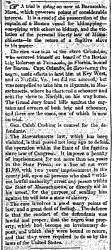Record Data
Transcription
A trial is going on now at Barnstable, Mass., which possesses points of considerable interest. It is a case of the prosecution of the captain of a Boston vessel for kidnapping-conspiring with others to kidnap, and the violation of the personal liberty law of Massachusetts-in the return of a fugitive slave to his master.
The case was that of ths slave Columbus, who secreted himself on board of the Boston brig Roberson at Pensacola, in Florida, bound for Boston. Capt. Orlando, on discovering the negro, made efforts to land him at Key West, and at Norfolf, Va., but did not succeed, but was compelled to take him to Hyannis, in Massachusetts, where he chartered a schooner and sent the slave to Norfolk on his way home. The Grand Jury found bills against the captains and owners of both brig and schooner, and these are the cases, one of which is now on trial.
Gen. Caleb Cushing is counsel for the defendants.
The Massachusetts law, which has been violated, is that passed not long ago to defeat the operation within the State of the fugitive slaw law of Congress. It imposes a penalty of imprisonment for not more than ten years in the State Prison, or a fine of not over $1,000, with two years imprisonment in the county jail, upon all persons who shall "without lawful authority" arrest any person within the State of Massachusetts, or directly aid in his arrest, for the purpose of sending him against his will into a state of slavery.
The case involves a good many points of law, and a great deal of feeling. The defence is that the conduct of the defendants was lawful and proper; that the negro was property, which had become an involuntary deposit, and which they were bound to return, and that they were required to do so by the laws of the United States.

